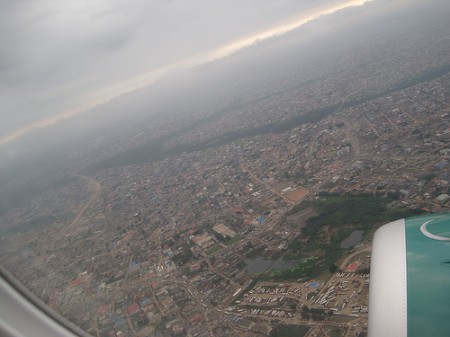
This blog post is the first of a series of contributions documenting time spent in southern Nigeria to attend a conference and gather data for the targeting energy infrastructure (TEI) project.
“Was that Wole Soyinka?” I said to myself as I walked passed a man in the Charles de Gaulle airport that looked strikingly similar to renowned Nigerian author, activist, and Nobel laureate. After all, it was barely 2 weeks ago that I was watching a segment on CNN where Christiane Amanpour interviewed Dr. Soyinka on Nigeria’s political stability in light of President Yar A’dua’s deteriorated health and the subsequent stalled peace process in the volatile Niger Delta region where local militants have attacked the energy sector and fought government forces in a campaign for a greater share of oil revenues. In addition to his literary success, Mr. Soyinka is a respected figure in Nigeria where he has been a longtime critic of political corruption and advocate for electoral reform. More recently, he has played a key role in mediating the Niger Delta amnesty process. Needless to say, watching the interview reminded me that this was a person I hoped to meet one day…
Arriving at the gate to catch a flight to Lagos, Nigeria, the same man entered the area and took a seat. After seeing a few people approach and shake his hand, it was clear that this was Dr. Soyinka. Gathering my nerve (yes, I had butterflies), I crossed the room to say hello. As we began to talk (honestly, I don’t think he had a choice since I proceeded to move his bag to the side to make room for me to take a seat), I was thinking to myself how fortuitous it was to meet such an important figure from the very country that I would be spending the next three weeks performing research and attending a conference on security issues in the Niger Delta. Though he may had been wondering to himself “who is this woman and where is the ‘off’ button?”, he was entirely gracious and engaging.
Boarding the plane, energized this chance encountered, I couldn’t help but wonder about the other exchanges that lay ahead. In the coming days I will be interacting with all parts of Nigerian society – ranging from people working in restaurants, students, educators, members from the NGO community and government, to those that have engaged and/or been affected by the militancy and criminality in the Niger Delta. As someone who researches the security issues in this region and the role of the energy sector, I hope to get a flavor of the local perceptions and opinions. In doing so I will document those exchanges and share my observations here.
Next stop, Lagos.

